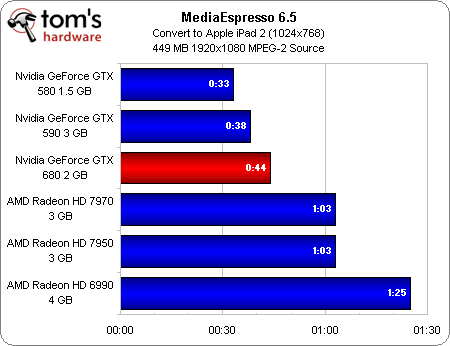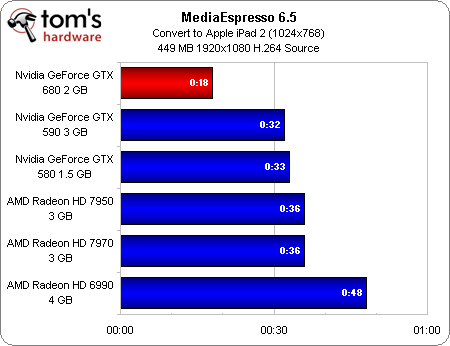GeForce GTX 680 2 GB Review: Kepler Sends Tahiti On Vacation
Enthusiasts want to know about Nvidia's next-generation architecture so badly that they broke into our content management system and took the data to be used for today's launch. Now we can really answer how Kepler fares against AMD's GCN architecture.
Benchmark Results: NVEnc And MediaEspresso 6.5
Back when Intel introduced Quick Sync as Sandy Bridge’s secret weapon, I estimated that it’d take both AMD and Nvidia about a year to go from CUDA- and APP-based video transcoding to a more purpose-built fixed-function pipeline capable of better performance at substantially lower power use.
Well, AMD introduced its solution almost exactly one year after I wrote Intel’s Second-Gen Core CPUs: The Sandy Bridge Review. Unfortunately, drivers enabling the hardware-based feature weren’t ready when its Radeon HD 7970 launched. They didn’t make it into the Radeon HD 7950 review, either. We missed Video Codec Engine functionality a couple of weeks later when Radeon HD 7770 and 7750 hit our lab. And we were told to keep waiting more recently before the Radeon HD 7870 and 7850 introduction.
Now it’s Nvidia’s turn. GeForce GTX 680 includes a feature called NVEnc theoretically able to take a number of input codecs and decode, preprocess, and encode H.264-based content.
Intel’s year-old Quick Sync feature accepts MPEG-2, VC-1, and H.264 and outputs MPEG-2 or H.264. Conversely, Nvidia is not specific about compatible input formats. However, we know it’s limited to H.264 output. But while Intel’s engine maxes out at 1080p in and out, NVEnc purportedly supports up to 4096x4096 encodes.
Like Quick Sync, NVEnc is currently exposed through a proprietary API, though Nvidia does have plans to provide access to NVEnc through CUDA.
Nvidia gave us access to a beta version of CyberLink’s MediaEspresso 6.5 with support for its NVEnc fixed-function encode/decode acceleration feature.
Our standard workload for this app involves converting an almost-500 MB MPEG-2 file into an iPad 2-friendly H.264-encoded movie. We ran it over and over, coming up with inferior performance on the GeForce GTX 680 compared to Nvidia’s GeForce GTX 580 or 590. Then, the company let us know that there’s a bug in its driver affecting the performance of MPEG-2 transcodes.
Get Tom's Hardware's best news and in-depth reviews, straight to your inbox.
So, I grabbed the H.264-based trailer for The Assault and tried again. Sure enough, NVENC made a much more pronounced difference, cutting the transcode time almost in half compared to the other two Nvidia cards.
It’s worth mentioning that, whereas we’ve had major issues getting AMD’s hardware-accelerated encode working in MediaEspresso, the latest drivers and latest build of CyberLink’s software seem to address our struggles. However, performance remains pretty modest. While the new Radeon HD 7900-series cards manage to slightly trail Nvidia’s prior-generation hardware in an H.264-to-H.264 transcode, the MPEG-2-to-H.264 operation is far less favorable. In both cases, the Radeon HD 6990 shows downright poorly.
Now, as far as we know, AMD’s Video Codec Engine—introduced late last year and conceptually similar to NVEnc—is still not functional. There’s a good chance this could help put AMD’s newest cards back in the running. However, the fact that we’re still waiting for driver support almost four months later is not impressive.
Current page: Benchmark Results: NVEnc And MediaEspresso 6.5
Prev Page Benchmark Results: Compute Performance In LuxMark 2.0 Next Page Temperature And Noise-
outlw6669 Nice results, this is how the transition to 28nm should be.Reply
Now we just need prices to start dropping, although significant drops will probably not come until the GK110 is released :/ -
Scotty99 Its a midrange card, anyone who disagrees is plain wrong. Thats not to say its a bad card, what happened here is nvidia is so far ahead of AMD in tech that the mid range card purposed to fill the 560ti in the lineup actually competed with AMD's flagship. If you dont believe me that is fine, you will see in a couple months when the actual flagship comes out, the ones with the 384 bit interface.Reply -
Chainzsaw Wow not too bad. Looks like the 680 is actually cheaper than the 7970 right now, about 50$, and generally beats the 7970, but obviously not at everything.Reply
Good going Nvidia... -
rantoc 2x of thoose ordered and will be delivered tomorrow, will be a nice geeky weekend for sure =)Reply


